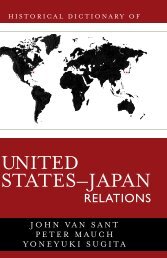New History Textbook (Chapter 4 & 5) 2005 version - Bakumatsu Films
New History Textbook (Chapter 4 & 5) 2005 version - Bakumatsu Films
New History Textbook (Chapter 4 & 5) 2005 version - Bakumatsu Films
Create successful ePaper yourself
Turn your PDF publications into a flip-book with our unique Google optimized e-Paper software.
58 The Russo-Japanese War<br />
Why did Japan decide to start the Russo-Japanese War?<br />
The Anglo-Japanese Alliance<br />
The experience of the Tripartite Intervention made it clear that Japan would have to enter into an<br />
alliance with either Russia or England. Within the Japanese government, opinions were divided as<br />
to which nation to choose. At the heart of the debate were perceptions about Russia. When the<br />
Boxer Rebellion broke out in China in 1900, the Russians used it an excuse to send 20,000<br />
soldiers to northeastern China; they remained there even after the rebellion had been crushed. The<br />
major question debated was whether Japan could convince Russia not to move its troops from<br />
Manchuria into the Korean Peninsula.<br />
The debate was settled by a written opinion prepared by Komura Jutaro, minister of foreign affairs.<br />
His opinion weighed the merits of an alliance with Russia or Great Britain, and concluded with the<br />
recommendation that Japan opt for an Anglo-Japanese alliance. Komura’s written opinion was<br />
adopted as government policy and used as the basis for negotiations. In 1902, the Anglo-Japanese<br />
alliance was concluded. During the 20 years it remained in force, it contributed significantly to<br />
Japan’s security and prosperity.<br />
The Outbreak and Course of the Russo-Japanese War<br />
Boasting a national budget and military strength 10 times as large as Japan’s, Russia had<br />
reinforced its troops in Manchuria, and begun construction on a military base in North Korea. It<br />
was clear that if Japan stood by idly, the Russian military presence in the Far East would grow so<br />
powerful that Russia would have a clear competitive edge over Japan. The Japanese government<br />
decided to initiate hostilities with Russia before it was too late.<br />
The Russo-Japanese War began in February 1904, when Japan launched an attack on a Russian<br />
military vessel. Its battles were fought on Korean and Manchurian soil. In 1905, Japan’s armed<br />
forces succeeded in occupying Liaodong after a tremendous struggle, and went on to win another<br />
victory at Mukden.<br />
In an attempt to turn the tables on its superior opponent, Russia dispatched its Baltic fleet from the<br />
Baltic Sea. Thirty-eight of the fleet’s ships rounded the southern tip of Africa and crossed the<br />
Indian Ocean. After a seven-month voyage, the Baltic fleet arrived at the Japan Sea. Awaiting the<br />
Russians was Japan’s Combined Fleet under the command of Admiral Togo Heihachiro. With<br />
their superior morale and technical skills, Togo’s men annihilated the Baltic fleet, scoring a<br />
miraculous victory that has left its mark in the annals of history (Battle of Tsushima).<br />
A Japanese Victory that Changed the World<br />
By the time Japan emerged victorious from the Battle of Tsushima, military expenses (for which<br />
27













